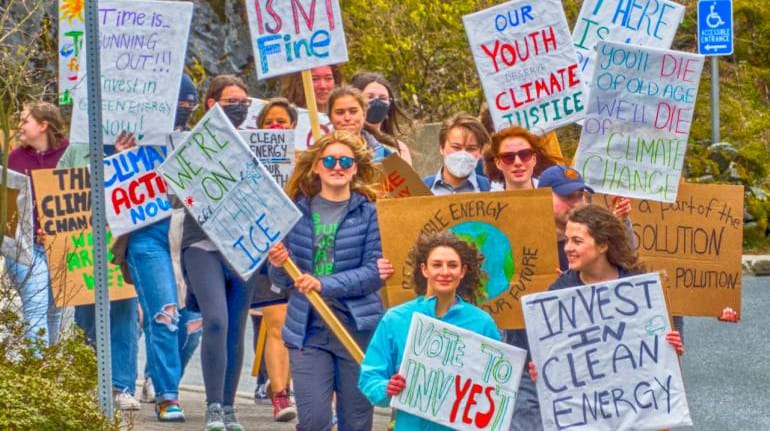



Time is running out. Our planet is likely to cross a critical threshold for global warming within the next decade, as per a major new UN report released on March 20. To prevent the Earth from overheating dangerously to levels that harm human, plant and animal life, nations around the world will need to take immediate and drastic steps to cut greenhouse gas emissions.
Union environment minister Bhupender Yadav said the findings of the report, by the Intergovernmental Panel on Climate Change (IPCC), endorses the vision of ‘Mission LiFE’ launched by Prime Minister Narendra Modi in October 2022. The India-led global mass movement nudges individual and community action to protect and preserve the environment, and focuses on “mindful and deliberate utilisation” of resources.
“India welcomes the Synthesis Report of the Sixth Assessment Report of the IPCC (AR6-SYR). The report confirms climate change as one of the key environmental challenges facing humanity. The Synthesis Report for Policy Makers endorses India’s call for equity and climate justice,” Yadav said in a series of tweets.
So, what are the biggest takeaways from the report? Let’s find out.
1. Extreme weather is deeply impacting humans and natureMore than a century of unequal and unsustainable land and energy use has led to the highest concentrations of carbon dioxide in at least 2 million years and a 1.1°C increase in global temperatures above pre-industrial levels. It’s resulting in more intense and frequent extreme weather, including blistering heatwaves, droughts, powerful hurricanes and heavier rainfall, which is affecting people, wildlife and ecosystems all over the world.
With temperatures rising and precipitation rates slowing down, already approximately 3.3-3.6 billion people – about half of the world’s population - are contending with severe food and water insecurity for at least a month annually. This climate-driven food and water insecurity is only expected to worsen as temperatures rise. And when combined with other adverse events, such as wars and pandemics, it could have a deep impact on communities in the long run.
2. The Paris Agreement may not be enough196 countries adopted the Paris Agreement in December 2015. It established that the world must limit global temperature rise to well below 2° C in this century, and preferably under 1.5° C. As per scientists, beyond that, the impacts of heat waves, flooding, drought, crop failures and species extinction would be significantly harder for humanity to handle.
The Earth, however, has already warmed 1.1°C since the industrial age. And with global fossil-fuel emissions setting a new record in 2022, that goal is quickly becoming out of reach.
Among the most vulnerable to climate change are those from low-income countries, and who contribute least to global warming. This includes parts of Africa, Asia, Central/South America, least developed countries, small islands and the Arctic.
The report states that in the last decade alone, deaths from floods, droughts and storms were 15 times higher in highly vulnerable regions. It has once again brought into sharp focus the issue of loss and damages. “Climate justice is crucial because those who have contributed least to climate change are being disproportionately affected,” said Aditi Mukherji, one of the 93 authors of this report.
4. All hope is not lost yetPolicymakers have one last chance to shift course and save the planet from irreversible ecological catastrophe. It is, however, an ambitious plan. It would require nations to come together at once to cut greenhouse gases by nearly half by 2030. It would also need them to be carbon neutral by the early 2050s.
Taken together and immediately, these two steps could give the world a 50 percent chance to limit global warming to 1.5°C, as agreed in the Paris Agreement.
5. Adaptation is the key to survivalCountries and communities around the world need to find ways to adapt to climate change with actions to reduce or avoid greenhouse gas emissions. The report adds that doing so has wider benefits. For example, it says that access to clean energy and technologies improves health, especially for women and children. The economic benefits, on the other hand, for people’s health from air quality improvements alone would be roughly the same, or possibly even larger than the costs of reducing or avoiding emissions.
The report also calls for solutions to be locally appropriate and rooted in our diverse values to be truly effective. But a delay of even a few years could make climate-resilient development even more challenging and expensive. To mitigate and adapt, however, climate finance is important, and we need it now. Christopher Trisos, one of the report’s authors, says, “Accelerated climate action will only come about if there is a many-fold increase in finance. Insufficient and misaligned finance is holding back progress.”
Discover the latest Business News, Sensex, and Nifty updates. Obtain Personal Finance insights, tax queries, and expert opinions on Moneycontrol or download the Moneycontrol App to stay updated!
Find the best of Al News in one place, specially curated for you every weekend.
Stay on top of the latest tech trends and biggest startup news.